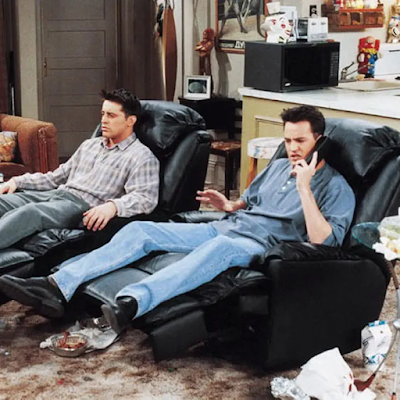I was forced to sit through endless episodes of Friends because my two daughters loved the show. They are 13 years apart so that meant I had to watch it all over again when my youngest daughter became a huge fan in her preteens. I tried to avoid commentary as I didn't much care for the show but every once in a while I would blurt out something and be admonished for it. So, I kept my thoughts to myself.
My biggest problem with Friends was that it could have been set anywhere. The twenty-somethings lived the lives of Reilly in what appeared to be a penthouse apartment with a balcony that looked out onto Central Park. If they all came from wealthy parents, one could understand it, but here they were in an odd assortment of jobs trying to make ends meet. I suppose the producers wanted to give their cast plenty of room to move around unlike the claustrophobic conditions of Seinfeld, which Friends was initially paired with on NBC.
The cast were virtual nobodies save maybe Courtney Cox, who had been made famous by crashing the stage of a Bruce Springsteen concert and dancing with the Boss. Turns out that was staged but no matter. However, it didn't take long for all of them to become stars, most notably Jennifer Aniston who became the "It Girl." For awhile there was no way to escape her. As a result I developed an aversion to her until I saw Office Space. She was good in that movie, essentially playing against type. Have to thank Mike Judge for that.
I couldn't stand Ross. Everything about him turned me off. It reached the point that I would go into the kitchen and refresh my coffee when he appeared and come back only when I no longer heard his insufferable whiny voice. The girls didn't like him much either but they tolerated him. Turns out David Schwimmer was essentially Ross in everything he did.
As for the others, I didn't think much of them one way or the other. I liked Phoebe only because she was cut from a different cloth. I laughed during the episode where she gave her song Smelly Cat to a friend who made it into a jingle for a kitty litter campaign. Lisa Kudrow had a kind of off-pitch humor that made her unique. Chandler and Joey were your typical frat boys trying to make it big in New York. Yet, here I am reading all these accolades for Matthew Perry on social media as if he was some kind of comic genius.
Apparently he had a pretty high opinion of himself as well, releasing a book last year where he told all about his opioid addiction as the result of a jet ski accident as well as dish on his "friends." The big takeaway was him lamenting the untimely death of River Phoenix. While exalting the young actor, who died at 22, Matthew couldn't help but insert that he had the better comic timing. But, what really stuck was him saying that it is too bad Keanu Reeves, who co-starred with River in My Own Private Idaho, is still around. No one really understood where that came from.
I think what Matthew lamented most was that he didn't have a movie like that. I only remember him in The Whole Nine Yards and that mostly because of Bruce Willis. I found Matthew annoying. Not so much as David Schwimmer but not the kind of actor I would rave about as so many are doing now. Whether it was because of the Vicodin or his own limited skills, he got very few movie roles, consigned mostly to television appearances. Meanwhile, Keanu became a big star. Not that he is a great actor but apparently he is a super human being to hear all the stories, which I imagine got Matthew's goat as well. So, he decided to get a little dig in that backfired horribly.
For me Matthew Perry is just the personage of Chandler. By signing onto Friends in 1994 he forever consigned himself to this role. He may have had greater aspirations but he was no River Phoenix or even Keanu Reeves. He was just Chandler living on in syndication. Maybe if he had accepted it, the world would have seemed a better place. Instead, he apparently carried his bitterness with him to the end.

Comments
Post a Comment